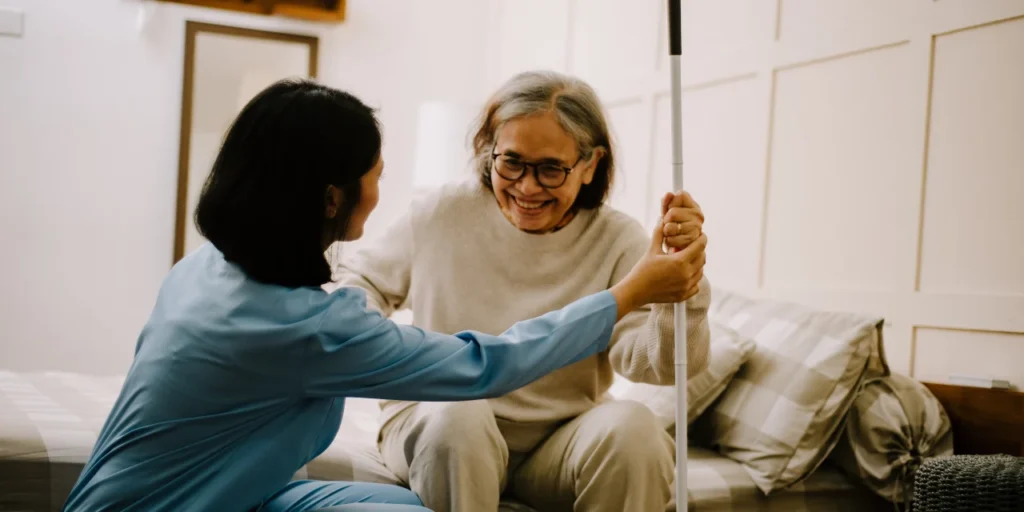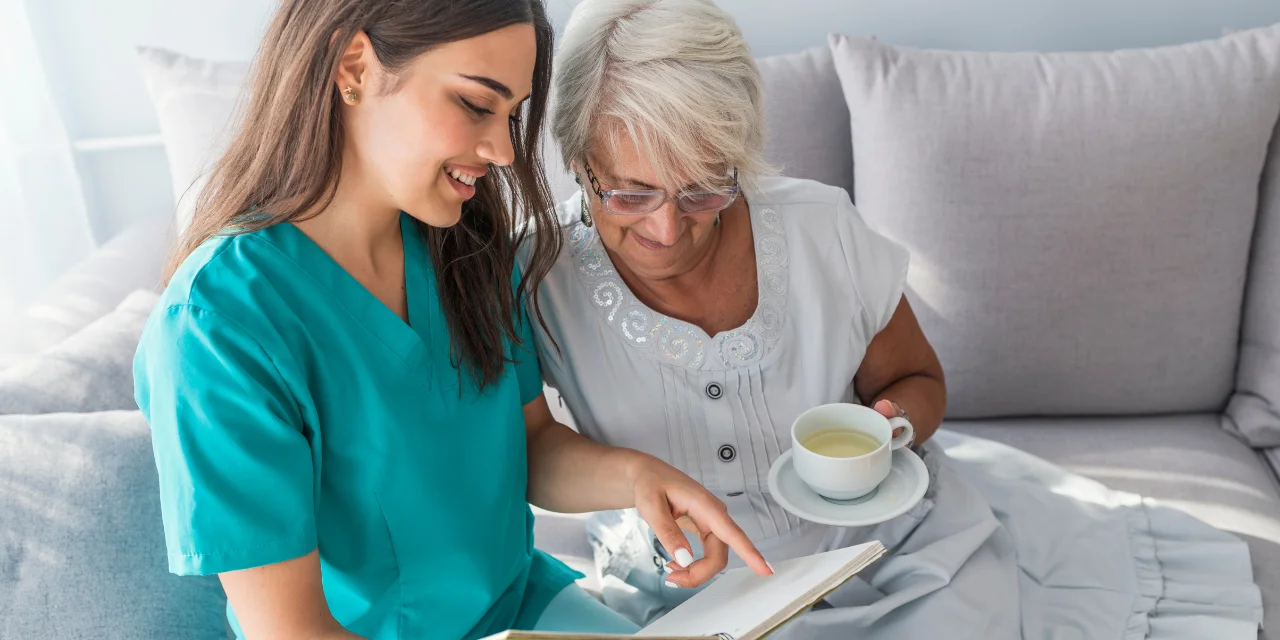Caring for an elderly loved one at home can be a rewarding experience, but it also comes with its challenges. Providing the right support and care can significantly improve their quality of life and well-being. In this blog post, we’ll explore eight practical ways to take care of your elders at home, ensuring they feel loved, respected, and well cared for.
Table of Contents: Ways to Take Care of Your Elders
1. Ensure a Safe Living Environment
Creating a safe and comfortable living environment is a crucial way to take care of your elders at home. As they age, they may face mobility issues or health challenges that make it harder for them to move around safely.
Home Safety Tips
- Remove Tripping Hazards: Keep floors clear of clutter, loose rugs, and electrical cords to prevent falls.
- Install Grab Bars: Place grab bars in the bathroom and along stairways to provide extra support.
- Improve Lighting: Ensure that all areas of the home are well-lit, especially staircases and hallways.
- Use Non-Slip Mats: Place non-slip mats in the bathroom and kitchen to prevent slipping on wet floors.
Regular Safety Checks
- Check Smoke Alarms: Make sure smoke and carbon monoxide detectors are working properly.
- Review Medication Storage: Keep medications in a safe place and ensure they are clearly labeled.
Check our home care service
2. Provide Nutritious Meals
A healthy diet is essential for maintaining the health and well-being of your elderly loved one. Proper nutrition can help manage chronic conditions, boost immunity, and improve energy levels.
Tips for Healthy Eating
- Balanced Diet: Include a variety of fruits, vegetables, whole grains, and lean proteins in their diet.
- Stay Hydrated: Encourage drinking plenty of water throughout the day to stay hydrated.
- Meal Planning: Plan meals ahead of time to ensure they receive a balanced diet.
- Special Dietary Needs: Be mindful of any dietary restrictions or needs, such as low-sodium or diabetic-friendly foods.
Easy Meal Ideas
- Soup and Sandwich: A warm bowl of soup paired with a whole-grain sandwich.
- Salads with Protein: Add grilled chicken, fish, or beans to salads for a nutrient-packed meal.
- Smoothies: Blend fruits, vegetables, and yogurt for a quick and healthy snack.
3. Encourage Regular Exercise
Physical activity is important for maintaining strength, flexibility, and overall health. Encouraging your elderly loved one to stay active can improve their mobility and reduce the risk of chronic diseases.
Simple Exercise Ideas
- Walking: A daily walk around the neighborhood or garden can do wonders.
- Chair Exercises: Simple exercises that can be done while sitting, such as leg lifts and arm circles.
- Stretching: Gentle stretching can help improve flexibility and reduce stiffness.
- Tai Chi or Yoga: These activities are great for balance and relaxation.
Creating an Exercise Routine
- Start Slowly: Begin with short, easy exercises and gradually increase the intensity.
- Make it Fun: Choose activities they enjoy to keep them motivated.
- Stay Consistent: Encourage regular exercise, even if it’s just a few minutes a day.
4. Provide Emotional Support
Emotional well-being is just as important as physical health. Providing emotional support can help your elderly loved one feel valued, reduce stress, and improve their overall quality of life. This way to take care of your elders at home will help their emotional state.
Ways to Provide Emotional Support
- Spend Quality Time: Make time for regular visits and engage in activities they enjoy.
- Listen Actively: Show empathy and listen to their concerns and feelings.
- Encourage Social Interaction: Help them stay connected with friends and family through phone calls, video chats, or visits.
- Involve Them in Decisions: Include them in decisions about their care and daily activities to help them feel in control.
Activities for Emotional Well-Being
- Hobbies: Encourage them to pursue hobbies they enjoy, such as knitting, gardening, or reading.
- Music and Art: Listening to music or engaging in creative activities can be therapeutic.
- Pet Therapy: If they love animals, spending time with pets can bring joy and comfort.
5. Assist with Daily Activities

Many elderly individuals need help with daily activities, also known as activities of daily living (ADLs). Providing support in these areas can help them maintain their independence and dignity.
Daily Activities to Assist With
- Personal Care: Help with bathing, dressing, grooming, and toileting.
- Household Chores: Assist with tasks such as cleaning, laundry, and meal preparation.
- Medication Management: Ensure they take their medications correctly and on time.
- Transportation: Provide transportation for medical appointments and errands.
Tips for Providing Assistance
- Be Respectful: Approach these tasks with sensitivity and respect their privacy and preferences.
- Encourage Participation: Let them do as much as they can independently, stepping in only when needed.
- Use Assistive Devices: Tools such as shower chairs, reachers, and walkers can make tasks easier and safer.
6. Manage Health and Medications
Managing health conditions and medications is a critical aspect of caring for an elderly loved one. Proper management can prevent complications and ensure they receive the necessary treatment.
Health Management Tips
- Regular Check-Ups: Schedule regular medical check-ups and screenings.
- Monitor Health Conditions: Keep track of any changes in their health and report concerns to their doctor.
- Follow Care Plans: Adhere to prescribed care plans and treatments for chronic conditions.
Medication Management Tips
- Create a Medication Schedule: Use a pill organizer and set reminders to help them take medications on time.
- Review Medications: Regularly review their medications with their doctor or pharmacist to avoid interactions and side effects.
- Keep an Updated List: Maintain a current list of medications, dosages, and schedules for reference.
7. Foster Social Connections
Maintaining social connections is vital for emotional and mental health. In this way to take care of your elders at home will improve their mental health. Helping your elderly loved one stay socially engaged can combat loneliness and improve their overall well-being.
Ways to Foster Social Connections
- Join Clubs or Groups: Encourage participation in local clubs, senior centers, or hobby groups.
- Plan Social Activities: Arrange regular get-togethers with friends and family.
- Use Technology: Teach them how to use technology to stay in touch with loved ones through video calls or social media.
- Volunteer Opportunities: Help them find opportunities to volunteer in the community, which can provide a sense of purpose.
Social Activity Ideas
- Game Nights: Organize board game or card game nights with family and friends.
- Book Clubs: Join or start a book club to share and discuss favorite reads.
- Community Events: Attend local events, such as fairs, concerts, or community gatherings.
8. Plan for the Future
Planning for the future is important for ensuring your elderly loved one’s needs are met as they age. This way to take care of your elders helps prevent emergencies and provides peace of mind for both you and your loved one.
Steps for Future Planning
- Discuss Care Preferences: Talk about their preferences for future care, including living arrangements and end-of-life wishes.
- Create a Care Plan: Develop a care plan that outlines their current and future care needs, including financial and legal considerations.
- Review Legal Documents: Ensure they have up-to-date legal documents, such as a will, power of attorney, and advance directives.
- Explore Care Options: Research and consider different care options, such as home care, assisted living, or respite care.
Tips for Effective Planning
- Involve Your Loved One: Include them in discussions and decisions about their future care.
- Seek Professional Advice: Consult with healthcare professionals, financial advisors, and legal experts for guidance.
- Stay Informed: Keep informed about available resources and support services that can help with future care needs.
Conclusion
Caring for an elderly loved one at home involves more than just meeting their physical needs. It requires a holistic approach that includes ensuring their safety, providing nutritious meals, encouraging exercise, offering emotional support, assisting with daily activities, managing health and medications, fostering social connections, and planning for the future. By taking these ways to take care of your elders at home which enhances their quality of life and well-being.
If you found this guide helpful, please share it with others who may benefit from this information. For more tips and advice on caring for your elderly loved ones, visit our blog regularly.
Feel free to leave a comment or ask any questions you might have about taking care of elders at home. We’re here to help!




